Carolina Honors Five Alumni to Mark University Day
Posted on Oct. 13, 2014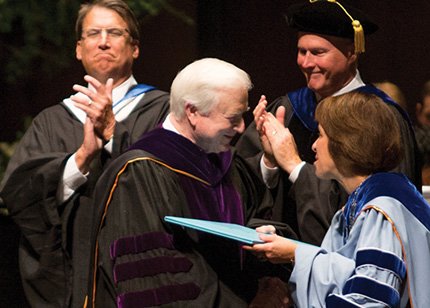
Chancellor Carol L. Folt and former Gov. James B. Hunt Jr. ’64 (LLBJD) shared in the annual University Day celebration on the Memorial Hall stage on Oct. 12 as keynote speaker Gov. Pat McCrory and Provost James Dean looked on.
University Day 2014 was highlighted with the presentation of Distinguished Alumna and Alumnus Awards to five alumni. The award recognition, a practice begun by the faculty in 1971, recognizes alumni who have made outstanding contributions to humanity.
Gov. Pat McCrory gave the keynote speech to help mark the University’s 221st birthday, celebrated each Oct. 12. The day marks the laying of the cornerstone of Old East, the nation’s first state university building, in 1793 and the beginning of public higher education in the U.S. The campus first celebrated University Day in 1877.
Many of North Carolina’s 74 governors have been a part of this traditional observation. McCrory, the first mayor of Charlotte to win the governorship after serving a record 14 years in that position, received degrees in political science and education from Catawba College. He worked for Duke Energy before entering public office.
Chancellor Carol L. Folt, speaking a year to the day after being installed as Carolina’s 11th chancellor, told the crowd assembled in Memorial Hall: “Now, 365 days later, I can honestly say, the more that I have learned, the prouder I have become of Carolina; the more people I have met, the commitment, the service and truly outstanding research I have seen, and the explosive talent and potential of our students, makes me have great optimism about our future.”
Folt described much of UNC’s history through the dream of William Richardson Davie. On Oct. 12, 1793, Davie “anchored this place to North Carolina soil and guaranteed a future we live now. Think of it – with daring vision, Gov. Davie looked into a wilderness, literally a forest at the top of a hill, and he saw a university. He introduced an idea, a revolutionary idea, of a public university created for the people of North Carolina, to lawmakers just as the state officially joined the brand new nation in 1789. His vision, created a future that mirrored the ideals of our nation’s new democracy, and that vision as been expanded by every person who has walked our campus and resulted in one of our state’s most treasured and valuable institutions. From Gov. Davie onward, every North Carolina governor has walked these campus pathways, whether as student, parent, trustee or distinguished guest. They have honored our University at University Day or Commencement and celebrated our teaching, research and service with us.”
In his remarks, McCrory said: “Chapel Hill is the pinnacle. It is the center of higher education in North Carolina.” He also stressed, as he has in recent public appearances, that colleges must be “honing in on skills and subjects that employers need while stimulating our students’ interests.”
Business owners tell him they cannot find workers with the skills they need; “a job skills gap does exist,” he said. “These findings are a wake-up call.”
Folt noted that throughout UNC’s history, “visionaries [in addition to Davie] have seen futures for us that shaped revolutionary paths – from 1919 to 1930, a period spanning historic global turmoil, coming out war, the roaring 20’s, depression – UNC’s President Harry Chase – guided Carolina to national prominence as an exemplar of the modern university. He saw what others did not – he did not give into despair, but guided us to a prominent future.”
Chase and his legacy are featured in the cover story of the September/October Carolina Alumni Review.
“With one brick, Gov. Davie dreamed us into being,” Folt said. “With a few more bricks (President Chase’s building campaign was very large), President Chase raised the bar on higher education learning and created the modern research university in Chapel Hill.”
This year’s recipients of Distinguished Alumna and Alumnus Awards, Folt added, embody that dream and vision. They are:
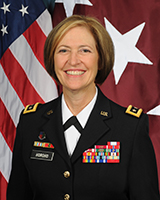
Patricia Dallas Horoho ’82
Army Surgeon General Patricia Dallas Horoho ’82. Horoho is the 43rd surgeon general of the U.S. Army. She is the first nurse and first woman to hold that position since it was established in 1775. Her responsibilities cover all facets of Army medicine, including the U.S. Army Medical Command, the third-largest health care system in the U.S. She also directs the Army’s medical and health care professional education, scientific research, medical material logistics, and training of all combat medics. Her many honors include commendation by Time Life Publications for her actions at the Pentagon on Sept. 11, 2001; selection in 2002 by the American Red Cross and Nursing Spectrum as one of 15 nurses receiving national recognition as a “Nurse Hero”; the USO’s 2009 Woman of the Year; and the UNC School of Nursing’s 2011 Alumna of the Year. On Sept. 11, 2014, she became the second nurse to speak at TEDMED Live in its 16-year history. Horoho has said that while at Carolina she learned that nurses can influence health care delivery and the lives of patients in all environments through direct and indirect care, policy, legislation, and the business aspects of health care.

James B. Hunt Jr. ’64
Former N.C. Gov. James B. Hunt Jr. ’64 (LLBJD). Hunt was the first N.C. governor to be elected to consecutive four-year terms, the state’s longest serving chief executive with 16 years in office and the first to possess the veto power, although he never used it. Throughout his long career, Hunt has been a strong advocate for public education at all levels. As governor, his influence was visible nationally as creator of the National Board for Professional Teaching Standards and chair of the National Commission on Teaching and America’s Future. In higher education, he called for larger stipends and health insurance coverage for graduate students and supported creation of a distinguished professors’ endowment fund. He established a reading program in primary schools and advocated for class-size limits. He championed creation of the N.C. School of Science and Mathematics, was instrumental in creation of Smart Start and helped bring about N.C. State’s Centennial Campus. He also launched efforts to recruit high technology businesses and established the Microelectronics Center of North Carolina and the N.C. Biotechnology Center. Today he continues his life-long advocacy of education through the James B. Hunt Jr. Institute for Educational Leadership and Policy.
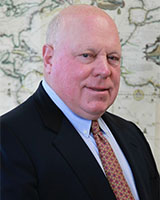
Andrew “Sandy” McNally IV ’63
National geographer Andrew “Sandy” McNally IV ’63. McNally is a geographer dedicated to furthering the field of cartography. Since 1899, the McNally family has been in the mapping business through the world-renowned Rand McNally Co. McNally received his undergraduate education at Carolina as did both of his sons. As chairman and CEO of Rand McNally from 1974 to 1997, he dedicated the firm to providing accurate maps in popular and accessible formats. He is now active in a number of successful business ventures. McNally has actively supported Carolina’s geography department for many years. He endowed the J. Douglas Eyre Distinguished Lecture Series, which brings distinguished speakers to Carolina for keynote campuswide lectures and opportunities to engage with students and faculty. He also endowed the McNally Fund for Excellence in Geography and has served on Carolina’s Board of Visitors.
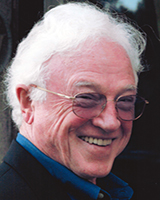
James R. Patton Jr. ’48
Public policy lawyer James R. Patton Jr. ’48. Patton is recognized nationally and internationally for his accomplishments in the practice of international and public policy law and the foundation of Patton Boggs, one of the nation’s most influential law firms. The firm has been ranked in the top 100 law firms by The American Lawyer every year since 2002. In his senior year at Carolina, Patton bought his first rare book, a fine copy of the first edition of Robinson Jeffers’ The Californians (1916). During the decades that followed, Patton amassed an exceptionally comprehensive collection of Jeffers and also a series of other important 20th-century literary collections, all of them distinguished for their depth and the exquisitely fine condition of the individual pieces. In 1995, Patton donated to Carolina’s Rare Book Collection his holdings of James Dickey, Sylvia Plath and Ted Hughes. Twenty years later, Patton continues to give such important items as his comprehensive collection of Jeffers material and a collection of the works of James Joyce that is remarkable for including virtually all of Joyce’s publications, many of them signed and all in impeccable condition.
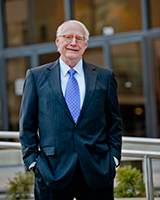
Wade M. Smith ’60
Trial lawyer Wade M. Smith ’60 (’63 JD). Smith has been one of North Carolina’s best known and most acclaimed lawyers for nearly 50 years. Smith was an All-American high school football player with many college scholarship offers, but he chose to accept a Morehead Scholarship to Carolina, where he excelled in both academics and athletics. He was co-captain of the football team and was inducted into the Order of the Golden Fleece. In 1964, he and his classmate J. Harold Tharrington founded the law firm of Tharrington Smith. Smith’s prowess as a trial lawyer is legendary. In 2008, the N.C. Bar Association established the annual Wade M. Smith Award “for a Criminal Defense Attorney Who Exemplifies the Highest Ideals of the Profession.” He has been included in the annual list of Best Lawyers in American for 25 years in succession. Smith served two terms in the N.C. General Assembly; he has chaired the Board of Directors of the General Alumni Association, is a recipient of its Distinguished Service Medal and is the permanent class president of the class of 1960.
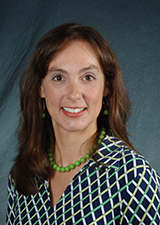
Krista Perreira
The Edward Kidder Graham Faculty Service Award, established by the Faculty Council in 2011 to recognize outstanding service by a faculty member, will be presented to Krista Perreira, professor of public policy and associate dean for undergraduate research.
Perreira is a health economist who studies disparities in health, education and economic well-being and interrelationships among family, health and social policy, especially as they affect Hispanic/Latino families. Her current research projects include the Hispanic Community Health Study/Study of Latinos and Implementing Health Care Reform in North Carolina.
Beginning in 1957 with William B. Aycock ’37 (MA, ’48 JD), University Day became the traditional inauguration day for new chancellors: Paul F. Sharp in 1964, J. Carlyle Sitterson ’31 in 1965, N. Ferebee Taylor ’42 in 1972, Christopher C. Fordham III ’47 (CMed) in 1980, Paul Hardin in 1988, Michael Hooker ’69 in 1995, James Moeser in 2000, Holden Thorp ’86 in 2008 and Carol L. Folt in 2013.
More online…
- McCrory to Deliver University Day Address
September 2014 news report - Details about University Day
- Carolina Installs Folt as Chancellor
From October 2013 - Five Receive Distinguished Alumni Awards
October 2013 news report - Water Institute Director to Speak on University Day
October 2012 news report - Head of UNC System Speaks at University Day
October 2011 news report - Alumna Noted for Innovation to Speak at University Day
September 2010 news report - Perdue Delivers University Day Address
October 2009 news report
